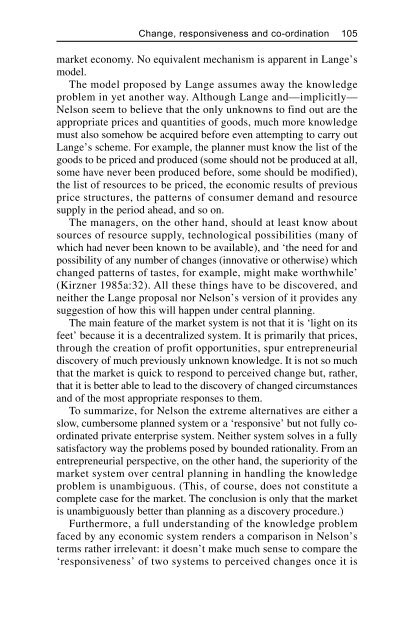Prices and knowledge: A market-process perspective
Prices and knowledge: A market-process perspective
Prices and knowledge: A market-process perspective
You also want an ePaper? Increase the reach of your titles
YUMPU automatically turns print PDFs into web optimized ePapers that Google loves.
Change, responsiveness <strong>and</strong> co-ordination 105<strong>market</strong> economy. No equivalent mechanism is apparent in Lange’smodel.The model proposed by Lange assumes away the <strong>knowledge</strong>problem in yet another way. Although Lange <strong>and</strong>—implicitly—Nelson seem to believe that the only unknowns to find out are theappropriate prices <strong>and</strong> quantities of goods, much more <strong>knowledge</strong>must also somehow be acquired before even attempting to carry outLange’s scheme. For example, the planner must know the list of thegoods to be priced <strong>and</strong> produced (some should not be produced at all,some have never been produced before, some should be modified),the list of resources to be priced, the economic results of previousprice structures, the patterns of consumer dem<strong>and</strong> <strong>and</strong> resourcesupply in the period ahead, <strong>and</strong> so on.The managers, on the other h<strong>and</strong>, should at least know aboutsources of resource supply, technological possibilities (many ofwhich had never been known to be available), <strong>and</strong> ‘the need for <strong>and</strong>possibility of any number of changes (innovative or otherwise) whichchanged patterns of tastes, for example, might make worthwhile’(Kirzner 1985a:32). All these things have to be discovered, <strong>and</strong>neither the Lange proposal nor Nelson’s version of it provides anysuggestion of how this will happen under central planning.The main feature of the <strong>market</strong> system is not that it is ‘light on itsfeet’ because it is a decentralized system. It is primarily that prices,through the creation of profit opportunities, spur entrepreneurialdiscovery of much previously unknown <strong>knowledge</strong>. It is not so muchthat the <strong>market</strong> is quick to respond to perceived change but, rather,that it is better able to lead to the discovery of changed circumstances<strong>and</strong> of the most appropriate responses to them.To summarize, for Nelson the extreme alternatives are either aslow, cumbersome planned system or a ‘responsive’ but not fully coordinatedprivate enterprise system. Neither system solves in a fullysatisfactory way the problems posed by bounded rationality. From anentrepreneurial <strong>perspective</strong>, on the other h<strong>and</strong>, the superiority of the<strong>market</strong> system over central planning in h<strong>and</strong>ling the <strong>knowledge</strong>problem is unambiguous. (This, of course, does not constitute acomplete case for the <strong>market</strong>. The conclusion is only that the <strong>market</strong>is unambiguously better than planning as a discovery procedure.)Furthermore, a full underst<strong>and</strong>ing of the <strong>knowledge</strong> problemfaced by any economic system renders a comparison in Nelson’sterms rather irrelevant: it doesn’t make much sense to compare the‘responsiveness’ of two systems to perceived changes once it is
















